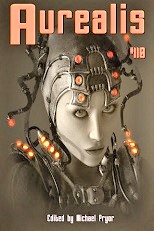“DSMV 295-90” by Kathryn Hore
Reviewed by Geoff Houghton
The lead story in Aurealis #110 is “DSMV 295-90” by Kathryn Hore. This tale is set in a post-apocalyptic Australia, a few years into the future. Some mixture of biological, chemical and conventional warfare has devastated the world. The protagonist, Jade, is the last surviving trained soldier. She is also a paranoid schizophrenic whose medications have run out and she now has the grandfather of all persecution delusions. However, without adding too many spoilers, the helpless young victim, Alice, is also not quite what she seems and…even paranoids can have enemies.
It was interesting that the protagonist was not a macho hero, but a deeply flawed female. It was refreshing that the breakdown in law and order following the destruction of all government machinery is not assumed to turn every survivor into either a ravening beast or a helpless victim. The post-apocalypse world drawn by the author is more considered and far more believable than such offerings as Mad Max, but it still does have a few logical inconsistencies. If these can be ignored then this story is an interesting and well-constructed exploration of how the balance between self-interest and selflessness, caution and co-operation, could be struck in a world without the external controls that we consider the norms of civilisation.
The second offering this month is the unusually titled “Car on Fire near Alice Springs” by P. R. Dean. This is neither mainstream SF nor fantasy. It is a straight horror story set in contemporary rural Australia. The point of view character is on a road-trip across the Northern Territory of Australia when a whole series of weird vehicle and fire-related events beset him. It is initially left up to the reader whether to believe these things happen in the protagonist’s head or in objective reality, but by the time the story ends, he is most certainly being actively pursued by the burning car of the title. The horror of the situation is painted well enough, but it somehow misses the mark, perhaps because the reader never really catches up with the author’s purpose.
The dystopic world depicted in “Storage” by B. A. Varghese is set in an anonymous city, about 100 years into the future. The point of view character, Caesar, exists rather than lives in a small apartment cube that is home, office and entertainment centre all rolled into one. The author paints a clear but rather demoralising word-picture of a world where bare survival is not a problem but where mere existence saps the soul. The dystopic element of this work is that Caesar can and does survive each day only to live, sleep and work another day in his small box. He exists but gets little joy out of it. He can barely afford to survive and is burdened with the costs of storing all of his and his ancestor’s digital data in such quantities that it can never realistically be examined to decide what could be deleted. As his storage bill rises higher and higher, he has had to abandon all non-essential activities, even his only real pleasure—watching old movies. Only then does he actually use any of the stored material that has been held and paid for all his life.
Caeser has a job that does not yet exist but that is certainly feasible. He is a eulogy designer. He creates multimedia productions to be played at funerals to celebrate the life of the deceased. He uses those skills to make a single multimedia video of his grandmother’s life and defiantly deletes everything else that is not included in that eulogy, rediscovering the truth that if you save everything then you might as well have saved nothing.
If you are discontent with your current life then you might choose to read this piece as a cure. There is at least a final faint ray of hope in the ending, but be prepared to come away from this story more depressed than you were when you entered it.
“2084” by Dirk Strasser is an SF dystopia set in Australia in the year 2084. The exact location has no real bearing on the storyline, it is the date that is important. A century later than the title of a book rediscovered by the protagonist.
The founding premise of this story is that personal search engines (called Babbles) have become ubiquitous. Everyone is dependent on them. If a fact is not found in the databases then it never existed. Other forms of record have vanished. The very name “book” is no longer known. Even personal memory is considered unreliable. So when our protagonist discovers that there is a global organisation deliberately manipulating those databases, it is the equivalent of changing history.
There is plenty of complexity in the story but also some outstanding questions and some anomalies. The storyline depends on the sudden introduction of a technique called brainwipe which allows the memories of human characters to be read and altered. This appears to be a technology level far above the remainder of this fictional world. There is also no explanation of the purpose behind the giant and powerful organisation that is manipulating the world’s databases. Unless you are happy to suspend such critical judgements then this story may not be for you.
Geoff Houghton lives in a leafy village in rural England. He is a retired Healthcare Professional with a love of SF and a jackdaw-like appetite for gibbets of medical, scientific and historical knowledge.
 Aurealis #110, May 2018
Aurealis #110, May 2018